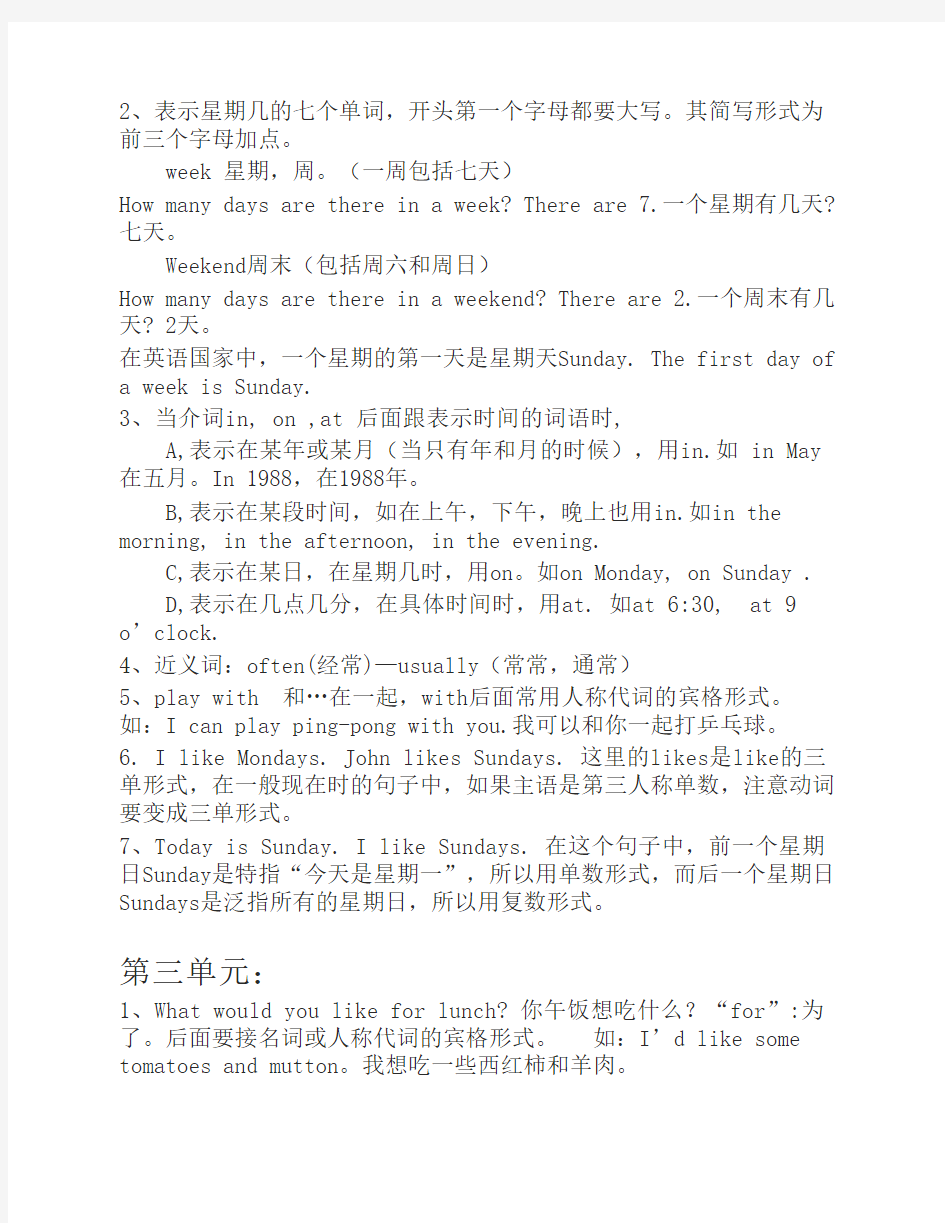五年级英语上册主要知识点


五年级上册主要知识点
第一单元:
1、以字母y结尾的名词变复数,如果字母y的前面是元音(a, e , i,
o, u),就在y后面直接加s。如:boy—boys. 如果字母y前面是辅
音,则把y变为i, 再加es. 如:lady—ladies city—cities
story--stories.
2、动词的第三人称单数:(所谓第三人称单数,就是指既不是你也不
是我的另外一个人,可以是具体的人名,他,她,或它,也可以是称呼
类,如my mother, my friend等。 当一个句子中的人物是第三人称单数,并且这个句子又是一般现在时态
时,该句子中的动词要使用第三人称单数形式。)
have—has like—likes do—does go—goes watch--
watches
3、词语变化:fun(形容词形式)――funny funny(名词形式)
――fun know(同音词)――no
he(宾格形式)---him
反义词:tall—short long—short young—old new—old strong—thin fat—thin
kind—strict active—quiet
4、be like与do like: 在本单元中,What’s …like?的句型是主句
型,这里的like是“像…一样”的意思. What’s …like?是问某某长
得什么样子,同学们千万别和like的另一个意思“喜欢”相混了。它的
答语一般用:He/She/ It is…(后面跟描写人的外貌特征的词语),
如:What’s your father like?你爸爸长得什么样子?。而在do like
的句子中,like的意思才是“喜欢”的意思。如:What does your
father like? 你爸爸喜欢什么?
第二单元:
1、当询问别人喜欢哪些课程时,classes应当用复数形式,因为别人
喜欢的课程可能不止一门。
What classes do you like? 你喜欢哪门课程?
2、表示星期几的七个单词,开头第一个字母都要大写。其简写形式为前三个字母加点。
week 星期,周。(一周包括七天)
How many days are there in a week? There are 7.一个星期有几天?七天。
Weekend周末(包括周六和周日)
How many days are there in a weekend? There are 2.一个周末有几天? 2天。
在英语国家中,一个星期的第一天是星期天Sunday. The first day of
a week is Sunday.
3、当介词in, on ,at 后面跟表示时间的词语时,
A,表示在某年或某月(当只有年和月的时候),用in.如 in May 在五月。In 1988,在1988年。
B,表示在某段时间,如在上午,下午,晚上也用in.如in the morning, in the afternoon, in the evening.
C,表示在某日,在星期几时,用on。如on Monday, on Sunday .
D,表示在几点几分,在具体时间时,用at. 如at 6:30, at 9 o’clock.
4、近义词:often(经常)—usually(常常,通常)
5、play with 和…在一起,with后面常用人称代词的宾格形式。 如:I can play ping-pong with you.我可以和你一起打乒乓球。
6. I like Mondays. John likes Sundays. 这里的likes是like的三单形式,在一般现在时的句子中,如果主语是第三人称单数,注意动词要变成三单形式。
7、Today is Sunday. I like Sundays. 在这个句子中,前一个星期日Sunday是特指“今天是星期一”,所以用单数形式,而后一个星期日Sundays是泛指所有的星期日,所以用复数形式。
第三单元:
1、What would you like for lunch? 你午饭想吃什么?“for”:为了。后面要接名词或人称代词的宾格形式。 如:I’d like some tomatoes and mutton。我想吃一些西红柿和羊肉。
2、some与any的区别:
(1)巧记:肯定句中用 some, some 也用于款待人的疑问句;
否定疑问用 any, 肯定句中用 any,任何一个接单数。(2)它俩都是“一些”的意思,后面既可接可数名词复数,又可接不可数名词,但用法有区别。
some 用于肯定句。但当表示请求、邀请、语气委婉,希望对方得到对方肯定回答时,可用于疑问句,此时句中常出现情态动词 can, may, could, would. any 用于否定句和疑问句。 如:
A:Could I have some meat?
B:Sorry, you can't have any meat. There isn't any.
3、I have eggplant and tomatoes for lunch. 我午饭吃茄子和西红柿。
这里的eggplant是指一道菜,是被切碎了的,熟的,所以这里的eggplant是不可数名词,不能用复数形式。
一日三餐的英语说法: breakfast 早饭 lunch 午饭 dinner 晚饭
西红柿 tomato 和土豆 potato (有生命的O字母结尾的单词)复数形式在后面加es tomatoes, potatoes
4.同义词: have to (不得不) -----must (必须)
5. What’ s your favorite food? 后面一般都跟集合的名词:food 食物 fruit水果 drink饮料 colour颜色 class 课程 book 书sport 运动 vegetable 蔬菜 number数字 day天
第五六单元
1.There be句型 包括 There is a/an …后面跟名词单数,表示一个。 例如:There is a mirror on the wall. There are some/many…后面跟名词复数,表示多个。例如: There are two end tables near the bed.
2. on与over的区别
on: 在。。。上面,表示与下面的物体相互接触,紧挨着。
over: 在。。。上面,表示与下面的物体没有接触,悬空着。
3. 一些特殊疑问词的意义与用法:
1) what 什么,叫什么,干什么等。例如: What’s this? 这是什
么? What’s your name? 你的名字是什么? What’s your father like? 你爸爸长得什么样子? What’s your mother? 你妈妈是干什么的?
2)where 哪里,用来问在什么地方,如Where are you? 你来自哪里? Where is your ruler? 尺子在哪里呢?
3)who 谁。 用来问人物是谁? 如Who’s that man? 那个男人是谁?4)whose 谁的,用来问东西是谁的。如: Whose book is this ? 这是谁的书?
5) what time 什么时间,用来问具体的时间是几点?
6)what coulor 什么颜色,用来问物体是什么颜色的。
7)when 什么时候, 用来问时间,后面常跟动词。 如: When do you get up?
8) how 怎么样?用来问人的身体状况。 如:How are you? 你好吗?9)how many 多少。用来问物体的数量。 如: How many books do you have? 你有多少本书?
10)how much 多少钱。用来问商品或者物体的价格。如:How much is your schoolbag?
11) which 哪一个,用来问具体的哪一个。如: Which class do you like best?你最喜欢哪一门课程?
7. 以系动词(am, is, are)和助动词(can, do)等开头的句子叫做一般疑问句。
如: Is your sister a teacher? Yes, she is. / No, she isn’t. Are you a student? Yes, I am. / No, I’m not.
Do you have new teachers? Yes, we do. / No, we don’t.
Does Amy have new teachers? Yes, she does./ No, she doesn’t.
Can you wash the clothes? Yes, I can. / No, I can’t.
Is there a river near your village? Yes, there is. /No, there isn’t
Are there any bridges in your village? Yes, there is. No, there aren’t.
